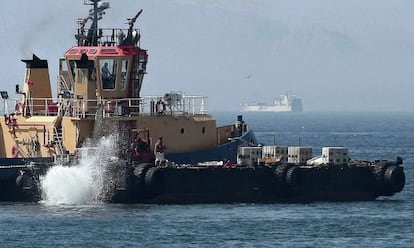Hardening relations: the politics of dumping concrete blocks
The Rock's artificial reef is similar to one built by Spain in 2006


José Manuel García-Margallo was in Brussels when he learned he had been made Spain's foreign minister, and immediately took the opportunity to make his views on Gibraltar clear, greeting British European Member of Parliament Chris Tannock with a curt "Gibraltar Español." He soon followed this up with statements to the media saying that "the Gibraltar joke is over," adding: "I will never set foot on the Rock until the Spanish flag flies over it." The minister's remarks set the tone for a policy of escalation unknown since the 1960s.
Not that Gibraltarians are particularly worried, seeing the upsurge in tension as little more than a distraction. "We knew the government would try to distract attention away from the Bárcenas scandal by attacking us," says Charles Gómez, a lawyer from an old Gibraltar family. The Rock produces its own desalinated water and generates electricity in an out-of-date power plant instead of importing them from Spain, reflecting the belief that Spain might cut off supplies.
The latest conflict was sparked by Gibraltar's decision to build an artificial reef close to its airport that it says will help regenerate fish stocks by preventing trawling. This has involved dumping over 70 concrete blocks into the sea, prompting a furious response from the government, which has described the move as "a violation of international law in Spanish waters," and a "violation of EU environmental law." Spain's position is that Gibraltar is ruining both the environment and local fishermen's livelihoods.
The problem with this argument is that in 2006, Spain did exactly the same thing, dumping almost 90 concrete blocks into the sea a few kilometers along the coast to build an artificial reef at the request of the local fishing industry, with the goal of preventing trawling. The policy dates back to 1989, when an EU directive required the regional government of Andalusia to regenerate fish stocks by building 25 artificial reefs over 20 years.
Environmentalist groups have pointed out the inconsistencies of the government's policy. "The background to this is political, not environmental," says an Ecologists in Action spokesman.
José Carlos García Gómez, chair of the marine biology department at Seville University and the author of several studies on artificial reefs, says Gibraltar is trying to prevent trawling and encourage line fishing. He says there is still no firm evidence whether artificial reefs help improve fish stocks.
Gibraltar Chief Minister Fabián Picardo says his government has been looking at ways to protect fish stocks for the last year: "We want to actively improve the resources of the area by creating an artificial reef. This is something we have discussed in parliament repeatedly. There is nothing secret about this. The root of the problem here is that we have no formal relationship with the Spanish government, no means to discuss policies jointly. But the area in question is not a fishing ground."
Tu suscripción se está usando en otro dispositivo
¿Quieres añadir otro usuario a tu suscripción?
Si continúas leyendo en este dispositivo, no se podrá leer en el otro.
FlechaTu suscripción se está usando en otro dispositivo y solo puedes acceder a EL PAÍS desde un dispositivo a la vez.
Si quieres compartir tu cuenta, cambia tu suscripción a la modalidad Premium, así podrás añadir otro usuario. Cada uno accederá con su propia cuenta de email, lo que os permitirá personalizar vuestra experiencia en EL PAÍS.
En el caso de no saber quién está usando tu cuenta, te recomendamos cambiar tu contraseña aquí.
Si decides continuar compartiendo tu cuenta, este mensaje se mostrará en tu dispositivo y en el de la otra persona que está usando tu cuenta de forma indefinida, afectando a tu experiencia de lectura. Puedes consultar aquí los términos y condiciones de la suscripción digital.








































